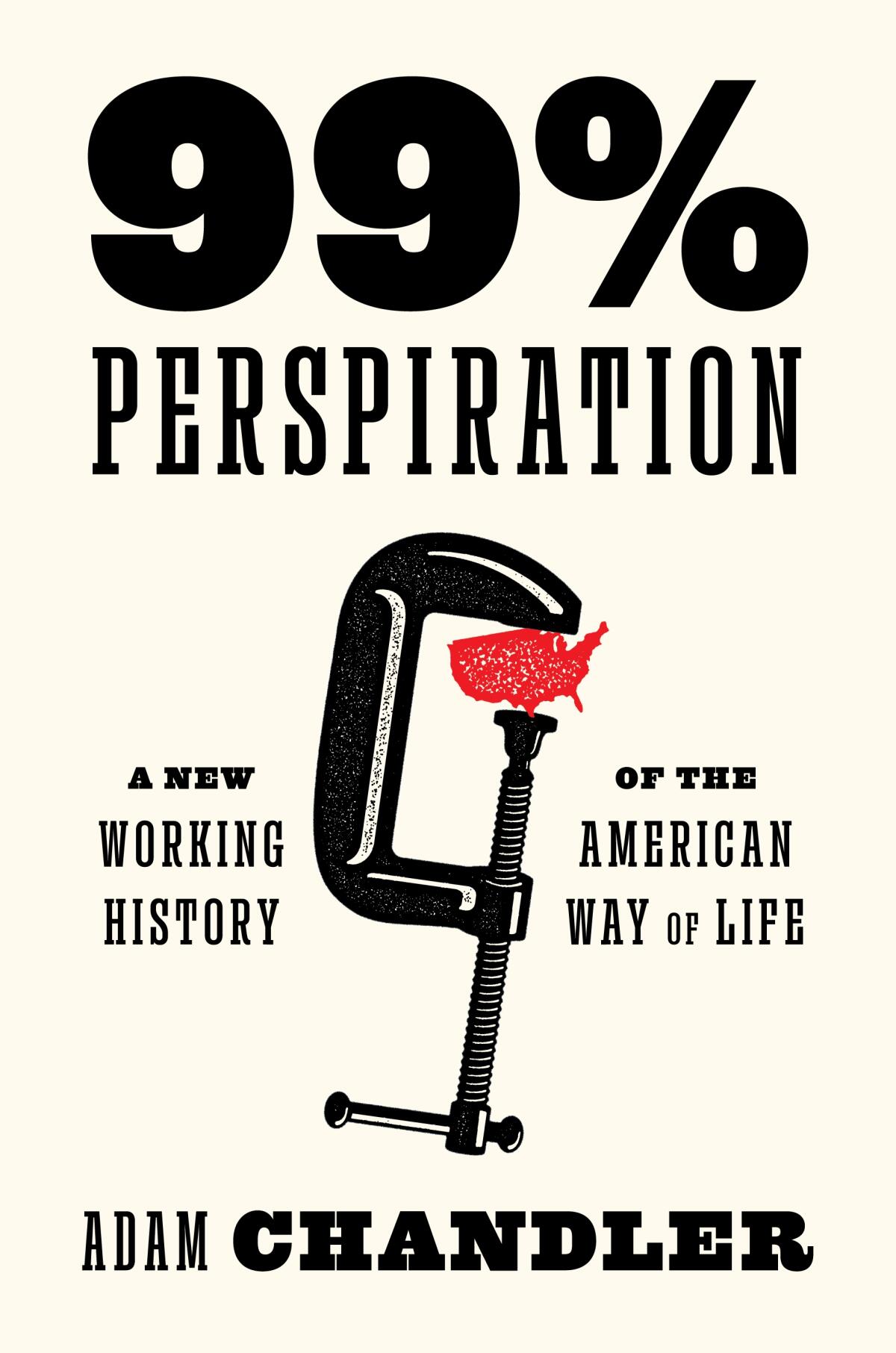
Book Review
99% Perspiration: A New Working History of the American Way of Life
By Adam Chandler
Pantheon: 284 pages, $28
If you buy books linked on our site, The Times may earn a commission from Bookshop.org, whose fees support independent bookstores.
Facts and figures go a long way toward illustrating America’s longstanding obsession with the virtues of hard work, and “99% Perspiration,” Adam Chandler’s mischievous mix of travelogue and social analysis, has plenty of both. For instance: A 2023 economic opportunity poll by Gallup found that 39% of Americans believed that they were failing to get ahead despite working hard. And: According to census data, more than 10% of nonelderly Americans (27.4 million) went through 2020 without health insurance (compared with 0.0% in all other industrialized countries).

The numbers are not kind, but they’re not the main thrust of Chandler’s book. That’s a good thing, regardless of whether you subscribe to the old maxim about “lies, damn lies and statistics” (attributed by Mark Twain to the British Prime Minister Benjamin Disraeli). This is a very human book about the roots and consequences of a very American dilemma: the belief that old-fashioned elbow grease will get you anywhere you want to go.
“99% Perspiration,” which takes its title from a quote attributed to Thomas Edison — “Genius is 1% inspiration and 99% perspiration” — is more than a mere diagnosis. It’s also a far-reaching study of how and why national myths are propagated and a ground-level account of the way we live and work now. It is, as they say, a good read, wrung from troubling realities.

Chandler, a former staff writer at the Atlantic and the author of “Drive-Thru Dreams: A Journey Through the Heart of America’s Fast-Food Kingdom,” ventures into the past and the present, the real and the fictional, seeking insight into why we devote so much time and energy to work, at the expense of everything else, and with ever-decreasing dividends. He dips into the country’s origins, and how foundational American thinkers like Benjamin Franklin saw hard work as a shared trait in a collection of colonies with little else in common. As Chandler writes, “America’s industry-obsessed, kite-in-a-thunderstorm lifestyle was one of the few things that united the various divided factions of America’s founding set.”
He pokes at the cruel irony of a nation that preaches the rewards of sweat equity but was built largely on the punishing, dehumanizing labor of slaves. And he explores the inherent vagueness and selectivity that define the notion of “American exceptionalism,” a concept that requires more and more cognitive dissonance the more it is pulled apart for analysis.
It’s fair to say that Chandler makes digressions and detours, and you may find yourself occasionally asking: Where are we going here? Then he playfully connects the dots, not always cleanly, but definitely with verve, and usually with good humor.
A stop in Oklahoma proves especially fruitful. First he visits with Arshad Lasi, who, along with his Indian immigrant parents, established the most successful running cannabis concern in Tulsa, an endeavor that taught him more about how business works than business school ever did. He visits a community that was rewarded for its bootstrapping grit with death and destruction: Greenwood, Tulsa’s “Black Wall Street,” which was burned to the ground by resentful white neighbors in the 1921 Tulsa race massacre. Then he ventures to Pawhuska, where “a confederation of villains” cheated and murdered the Osage community out of its oil money, an outrage chronicled in David Grann’s book “Killers of the Flower Moon” and its 2023 movie adaptation.
The lesson here is hard to miss. The extent to which hard work is rewarded has often depended on who’s holding the power and the gun.
There’s an element of social Darwinism to the work-work-work ethos, a hard-heartedness that Chandler connects to the likes of the eugenicist and longtime president of Stanford University Ray Lyman Wilbur. “It is common talk that every individual is entitled to economic security,” Wilbur once wrote. “The only animals and birds I know that have economic security are those that have been domesticated — and the economic security they have is controlled by the barbed-wire fence, the butcher’s knife, and the desire of others. They are milked, skinned, egged or eaten up by their protectors.”
And if figurative dehumanization isn’t enough, there’s always the literal kind. The author has some fun with a chatbot at a Hardee’s drive-through — for Chandler, it all comes back to fast food — setting out to stump it with a fairly simple request that it can’t accommodate. When a human being takes over for the machine, Chandler seems not just happy but palpably relieved. “I actually like it,” the human, named Kristi, says of the chatbot. “It’s very helpful when we’re shorthanded.”
There are alternatives to the eternal grind, and from an American perspective they seem downright radical. In 2016, the French Parliament passed a law designed to give employees the right to not respond to work-related communication after business hours. This is on top of the longtime legal mandate to take a lunch break. Yes, Chandler journeys to Paris, where he takes a tour dedicated to the popular Netflix series “Emily in Paris.” The show is about a go-go American who brings her can-do spirit to the City of Lights, whose denizens are a bit put off by her lack of chill. “You live to work,” chides Luc, a co-worker. “We work to live!” Touché, Luc. Now if you’ll excuse me, I must check my email.
Chris Vognar is a freelance culture writer.